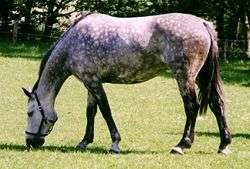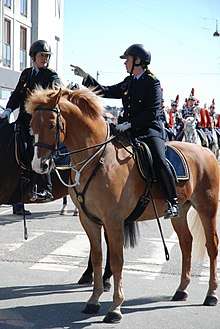hest
See also: heşt
English
Etymology
From Middle English, alteration of Middle English hes, from Old English hǣs (“command”). Akin to Old English hātan "to command". More at hight.
Pronunciation
- IPA(key): /hɛst/
- Rhymes: -ɛst
Noun
hest (plural hests)
- (obsolete) Command, injunction.
- c. 1610-11, William Shakespeare, The Tempest, Act III scene i:
- FERDINAND: […] What is your name?
- MIRANDA: Miranda — O my father! / I have broke your hest to say so.
- c. 1610-11, William Shakespeare, The Tempest, Act III scene i:
Related terms
Translations
command, injunction
|
Danish

hest
Etymology
From Old Norse hestr (“stallion”), from Proto-Germanic *hangistaz. Cognate to hingst (“stallion”).
Pronunciation
- IPA(key): /hɛst/, [hɛsd̥]
Inflection
Derived terms
Faroese
Icelandic
Norwegian Bokmål

Politi på hest i København, Danmark
Pronunciation
Etymology 1
Etymology 2
From Old Norse hestr, from Proto-Germanic *hangistaz.
Derived terms
This article is issued from
Wiktionary.
The text is licensed under Creative
Commons - Attribution - Sharealike.
Additional terms may apply for the media files.